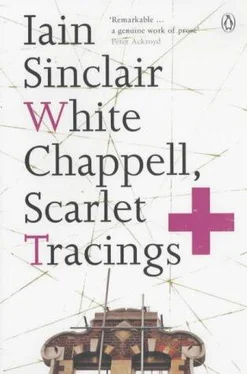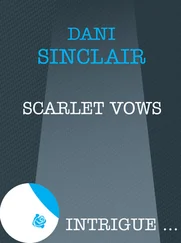Out from the hot room, the meat oven, to the cancelled spaces. Cooler, much cooler; cold. To Bucks Row, Hanbury, Matfellon, the White Mount, Berners, almost to the river. But it has already happened. He is foaming, white spittle; he is chewing leaves torn from the roadside. He is talking in tongues, prophesying what has already passed. He is seeing nothing. Robert Lees, quite blind, unravels the entrails of the maze. His brain is a stone of coral.
Further out, circling, deeper; it is almost morning. The party arrive at the house of a distinguished public man, at the gates, 74 Brook Street.
Impossible! This man has filled and still fills many of the most honourable offices of his profession, Baronet and Extraordinary Physician to the Queen; a philosopher and a man of strong will, yet of gentle presence, with soothing manners and a hawk’s eye; one of the most successful of those who have addressed themselves and given their lives to the relief of human suffering and the salvation of human life.
This cannot be, Mr Lees. The physician is not to be lightly disturbed, deflected from his duty; he belongs in the chronicle of society. He has served the highest in the land. Famed for the wise saws of which he is full. He plumes himself on his power of probing the secret hearts of his patients to the lowest depths by eagle glances and by pregnant and pithy pieces of professional sententiousness, enunciated in a melodramatic undertow. Nothing appears to proceed from the spontaneous emotion of the instant — everything is prearranged. He is a marvellous piece of human machinery.
No, sir. We must proceed with due caution. The doctor is not to be incontinently questioned: there has been a great mistake made. You are ill, Mr Lees. Not yourself, sir.
Persisting, Lees rushes out a description of the hallway: rough porter’s chair of black oak, stained glass beyond, a large mastiff at the foot of the stairs. I tell you, it is low-roofed, comfortable, and furnished with costly cabinets, also of oak.
We wait on the servants, until they stir. We are sweat-drenched, dusty, shrunken: unconvinced, on the second step. Ushered directly from door to dining-room. Blackmail House.
The room is long as a street; a girl folding back the shutters. Lady Gull receives them.
‘We have, Madame’ — Inspector Abberline feels that it is he who is being interviewed, and for the position of bootboy — ‘some questions to put to you. There are certain areas upon which you may be able to throw a light.’
The lady of the house, full-figured, easy, adjusts her gown at the throat, turning her face upon her inquisitor, whose back is to the window, red hair on fire.
‘Areas? You have ventured out at this inhuman hour to crave instruction — in geography?’
‘To relieve us, Madame, of particular difficulties. To furnish us with answers to the questions with which I am obliged, reluctantly, to confront you.’
Her gown, again, tightened. Abberline having an almost irresistible urge to check upon his own potential state of undress; feels that his choice of undershirt is being ruthlessly scrutinised.
‘Could we enquire if your husband, Sir William Withey Gull, was at home last evening, at midnight, and for the succeeding two or three hours?’
‘At home?’ Her voice was low, almost melodramatic.
‘Yes, Madame, at home. With you. Here.’
‘Do you seriously expect to establish, Inspector, whether at midnight my husband was honouring me with his company within his own house? Would you perhaps like to discover how precisely he was employed at that hour?’
Abberline finds it impossible to look directly at the woman. And though her hands are heavily ring’d, they are powerful; her face is powdered, her lips savage, her eyebrows quite alarming. He thinks of an owl: feathered immobile calm, razor claws hidden beneath a Japanese wrapper.
‘Perhaps, Inspector, it would soothe you to examine Sir William’s — bedroom? Are you searching for stolen silver, jewels, furs? You think this a likely crib? I could make arrangements for you to crawl beneath the bed. I will have cupboards emptied at your command.’
‘We are here in connection with a peculiarly savage murder. An unfortunate was mutilated last night in Whitechapel. Her womb torn out; her internal organs draped like bunting around the chamber.’
He had gone too far. It was unforgivable. His career was now over. The Lodge was closed to him.
Lady Gull did not shrink from the intrusion of horror. She toyed with a fork.
‘You come into my house and you bring with you unspeakable crimes. Crimes that you have now taken upon yourself to articulate, sparing none of the details that would shame a coroner’s court. You are quite mad, sir! This cannot go unremarked. I shall have occasion to speak with Sir Charles Warren. This is intolerable. An assault! Unwashed from the most barbarous slums in Europe, rubbing against vermin-infested walls, your arms scarlet with blood and filth — to be received in my husband’s house!’
A groan from Lees, head in hands. He is once more under the Royal Arch, nineteen years old, demonstrating clairvoyant tricks for the marble queen. Abberline, white to the temples, now doomed, and with a condemned man’s swagger.
‘If you would allow me, Madame, to examine Sir William’s wardrobe our work would be done.’
They climbed the stairs in silence. The Inspector nervously looking out the great mastiff, who was not to be seen.
The bedroom was immaculate. Fresh linen, bright rugs. An undistinguished watercolour, Thames barges. The boots in the wardrobe all shone accusingly. The long coats gleamed, a headless commission of enquiry. Shirts crisp as tissue paper. Forensic collars. Studs. Cuffs.
‘Would you care to take away for examination,’ said Lady Gull, who remained in the doorway, ‘Sir William’s underclothing?’
They left, were shown out, deposited in the sunshine. All against the tide of deliveries. Pitched out like dirty milkbottles. Parting, abruptly: the Inspector striding off, to no purpose, with his profession’s long experience of making that state look purposeful. On this ability his career had been built. To go by the book when the book said nothing.
Lees was deserted: his visions annulled. They could be transcribed as fiction. The myth, being freed from event, could gather far greater conviction. Released from himself, he hailed a cab; self-indulgent, and hungry, returned to the letter that he could now begin.
Lady Gull walked into her bathroom, sat in a wicker chair to unroll pink stockings, dainty slippers; to drape her patterned robe over a chairback, to face the mirror; full-chested, matted with body hair, right hand upon belly. Her hair was left upon a hook, a hollow cat. The pouting sardonic lips, a little too bright, parted to reveal strong square teeth. The powdered cheek clotted in the steam.
Wiping the mirror with a firm forearm, looks at herself, thick but unaroused, a knotted rope-end. Flattened nipples painted around with star-shapes, mapped skin: Sir William Withey Gull.
To: Caroline Haddon
‘Waiting for a Train’, Berwick Station
May 1875
Dear Carrie,
Since our talk together I have wanted to write to you on one or two points. One thing is instructive to me, as to the way in which it happens that my processes of thought seem to me to excite a mistrust or feeling of inaccuracy or partialness, even (excuse me — I only say seem ) in persons who so appreciate me, and enter into the results of my thinking as you do.
It is what I can scarcely now help calling my fluxion method of thinking; that is, the plan which I am quite conscious of when I look into the workings of my mind, of laying aside part of the visible elements of a case, in order better to see the others. What makes this process right is, that laying aside is remembered ; and what makes it necessary is the complexity of facts, the presence in all of them, not only of many, but of counteracting or balancing elements, so that the results look simpler than they are, and the full extent of some of the things present can be perceived only by getting rid, in thought, of the mixed-up influences of the others.
Читать дальше












